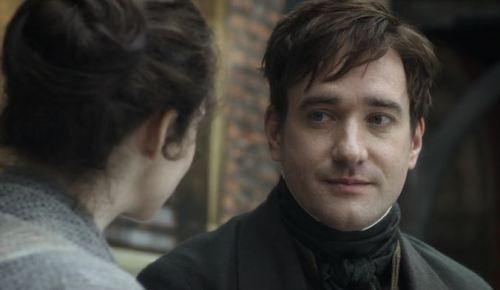
"There is one thing, Emma, which a man can always do, if he chuses, and that is, his duty..."
~Mr. Knightley, Emma (Jane Austen), ch. 18
The first character trait I want to address is kindness. It's been said that "kindness is the only language that the blind can see and the deaf can hear." In Little Dorrit, Arthur Clennam's kindness is most clearly shown in his behavior toward the Dorrit family. Seeking to right a wrong that he believes his family has committed against the Dorrits, he employs a detective to research their family's past and try to get them out of debtors' prison. Meanwhile, he also quietly pays Edward ("Tip") Dorrit's debts, even though Tip is an undeserving character who is frequently rude to Arthur.
John Harmon, alias Julius Handford, alias John Rokesmith, the hero of Our Mutual Friend (OMF), is a confused young man trying to make his own way in the world. In order to claim his inheritance from his late wealthy father, he must marry a young woman (Bella Wilfer) who he has never met, but on his way to see her, he goes missing. Presumed drowned by his acquaintances, he takes a false name and employs himself as secretary to Nicodemus Boffin, the man next in line to receive old Mr. Harmon's inheritance. John is so hard to understand in the beginning stages of the novel (especially since Dickens kept switching from alias to alias--obviously quite fond of the letter J) that I think I'm just going to skip over him for this character trait. Really, the best words to describe John in the first half of OMF are "cautious", "reserved" and "mysterious."
 |
| Denis Lawson as Mr. Jarndyce |
Next on my list is honesty. In Mr. Jarndyce's case, honesty is simply a way of life. In sharp contrast to his leech-like "friend" Harold Skimpole, Mr. Jarndyce would never dream of deceiving anyone, for any reason. When he begins to harbor romantic feelings toward Esther, he tells her truthfully and straightforwardly, accepting the fact that she may very well refuse him.
John Harmon, unfortunately, is not quite so honest as the other John. (Hope you've noticed by now that I'm referring to John Harmon as simply John, while referring to the hero of Bleak House as Mr. Jarndyce or simply Jarndyce. In doing this I, sadly, risk provoking Emma Woodhouse to wrath--"Never met him before in her life and she calls him 'Jarndyce'!") Ahem. Moving on... John Harmon's life in England is a Very Tangled Web of Deceit. (Tsk, tsk.) When he first emerges from the depths of the deep, dark, dank river (duhn-duhn-duhn!!) he takes the name of Julius Handford to disguise his real identity, and when he gets Mr. Boffin to hire him as secretary, he acts under the alias of John Rokesmith. One might argue that he is doing all this as a way to see the truth about the Boffins and how they will handle their inheritance, and therefore his motives are worthy. I certainly don't blame John for wanting some answers, but I can't condone his deceit in trying to find answers.
 |
| Matthew Macfadyen as Arthur Clennam |
When looking at compassion and sensitivity (for surely the two go hand-in-hand) I think that Arthur possesses (at least at first) only one of these great qualities. Certainly, compassion is something he does not lack--his attitude towards the Dorrits is exemplary--but he lacks some sensitivity. It might be obvious to the readers and movie viewers of Little Dorrit that Amy Dorrit is in love with Arthur, but to Arthur... well, let's just say I think my sister is justified in exasperatedly shrieking, "Blind as a bat, Arthur! You're BLIND AS A BAT!" Thankfully, however, by the end of the story he has realized his mistake. "How could I have not known it was you? It was always you!" he tells Amy. "What a blind idiot you must have thought me!" (And the audience nods emphatically. Or at least I do.)
Mr. Jarndyce is always aware of others' needs (feeling guilty when anyone is disadvantaged by the Chancery case, even though it's never actually his fault), and yet at one point in Bleak House he appears to be rather insensitive. When Richard and Ada ask him for permission to marry, he tells them to wait and to "love each other... from a distance." This might seem insensitive and callous, but Mr. Jarndyce really has the younger people's best interests at heart. He knows that neither is really ready to get married, and so he tells them to wait, even though it means that they resent him for a time.
 |
| Steve Mackintosh as John Harmon |
John Harmon, who has suffered rather greatly so far in this post (what on earth have I done to poor Mr. Harmon? I have no idea!) is now about to be praised a little. John proposes to Bella, but she turns him down because he is poor (or so she thinks.) Instead of getting angry, John merely steps back and goes to Mr. Boffin for advice. In order to help Bella see just how mercenary she has been (and hopefully to point her in the right direction), John and Mr. Boffin concoct a scheme that results in Mr. Boffin's ill-treatment of John, to see how Bella reacts. It couldn't have been easy for John to be constantly abused by Mr. Boffin (especially in front of the woman he loves!) but he puts up with it anyway because he knows that it will help Bella in the long run. And so I'm giving the compassion and sensitivity award to John Harmon... it could just as easily go to Mr. Jarndyce, but I like things to be even and poor John hasn't had anything yet. :)
A true gentleman, I think we will all agree, is always courageous. However, courage isn't necessarily something that involves swashbuckling swords, rearing horses and daring deeds. In John Harmon's case, courage is played out in the words of Winston Churchill: "Courage is what it takes to stand up and speak; courage is also what it takes to sit down and listen." The time that John spends living as another person--being treated as a distrusted stranger instead of The Heir To His Father's Millions--is a time in which he has to sit down and listen to other people... and maybe learn something about himself. (Wow, I'd better stop before I start sounding like a Hallmark commercial...)
"It is curious," Mark Twain wrote, "that physical courage should be so common in the world and moral courage so rare." If we're going to be Deep and Intellectual here (are we? Let's just try it) we can say that everyone in Bleak House has a position to fill, and Mr. Jarndyce's is the position of Moral Rock That Does Not Move. When anyone has a problem, they go to him. Esther Summerson, another courageous character, looks up to him. Even Richard (and no, I'm not going off into a litany about How Ungrateful Richard Is) respects Mr. Jarndyce's opinion (by the end of the story, that is) because he knows that Mr. Jarndyce possesses wisdom to go with his courage.
It's a hard call to decide who most deserves the title of courageous, but I think this time it has to go to Arthur Clennam. Arthur has lived his whole life under his mother's thumb, constantly being reminded that he isn't good enough. When his father dies, he's left with a bucketload of responsibilities, and yet his mother takes those away from him and he's left with... nothing. Practically disowned and with only a few friends (but let's all give a shout-out to Mr. Meagles here!), Arthur doesn't let his difficult circumstances get him down. Instead of throwing a pity party for himself, he reaches out to other people who need his help.
The last item on my list is selflessness, and Arthur certainly exhibits that. Just reread everything I said in the previous paragraph. ;)
John exhibits a great deal of selflessness too, especially near the end of Our Mutual Friend, when his father's last will reveals that the inheritance will go to the Boffins and not to him after all. He could have contested the will, he could have even persuaded the Boffins to let him have the money, but of course he didn't. (And as it turns out, the Boffins turned around and handed the inheritance back to him anyway, so all's well that ends well.)
But really, the man who shows the most selflessness of all, the man whose picture should show up in the dictionary next to the definition of "unselfish", is Mr. Jarndyce. He was in love with Esther, as we previously established, and was absolutely thrilled when she agreed to marry him. When Esther's face becomes scarred from smallpox, it makes absolutely no difference to him and he is instrumental in encouraging Esther to go on with life as she had before. But gradually Jarndyce begins to realize that Esther is not in love with him, but with Allan Woodcourt--and that her sense of duty is too strong to break off the engagement. So he releases her from the engagement and tells her to marry Mr. Woodcourt and be happy. "No tears, now. This is to be a day of joy." You could say that Esther's wedding day is to be a day of joy for everyone but Mr. Jarndyce, but I don't agree--because though he broke his own heart in order to make Esther happy, Mr. Jarndyce derives joy from giving it to others...
...which is why Mr. Jarndyce wins my little Dickens Hero Tournament. It's a hard call between him and Arthur (sorry, John) but I have to say that Mr. Jarndyce is the most deserving of the title hero. He is kind, truthful, compassionate, sensitive, courageous and above all, absolutely unselfish.
And that, ladies, is what makes a true hero.



5 comments:
Thanks so much for having me guest post, Miss Laurie! I really enjoyed writing this and it was such fun to be a part of your Dickens week.
I love John Jarndyce and Arthur Clennam, but I need to read and watch Our Mutual Friend so I can become better acquainted with John Harmon.
Great post! I'm always sad that John Jarndyce doesn't get a happy ending. He's such a noble character, but he loses practically everything.
Why, oh why, did I forget all about John Jarndyce when answering the tag questions?- you're right; he really is amazing.
Isn't it sad that your favorite one doesn't marry the heroine, Miss Dashwood? Sigh.
Ah, poor John Harmon. Well, maybe I wouldn't like him as well in the book. ;-) I liked him a lot in the movie.
Your 'Never seen him in my life and I call him...' made me laugh...
Post a Comment